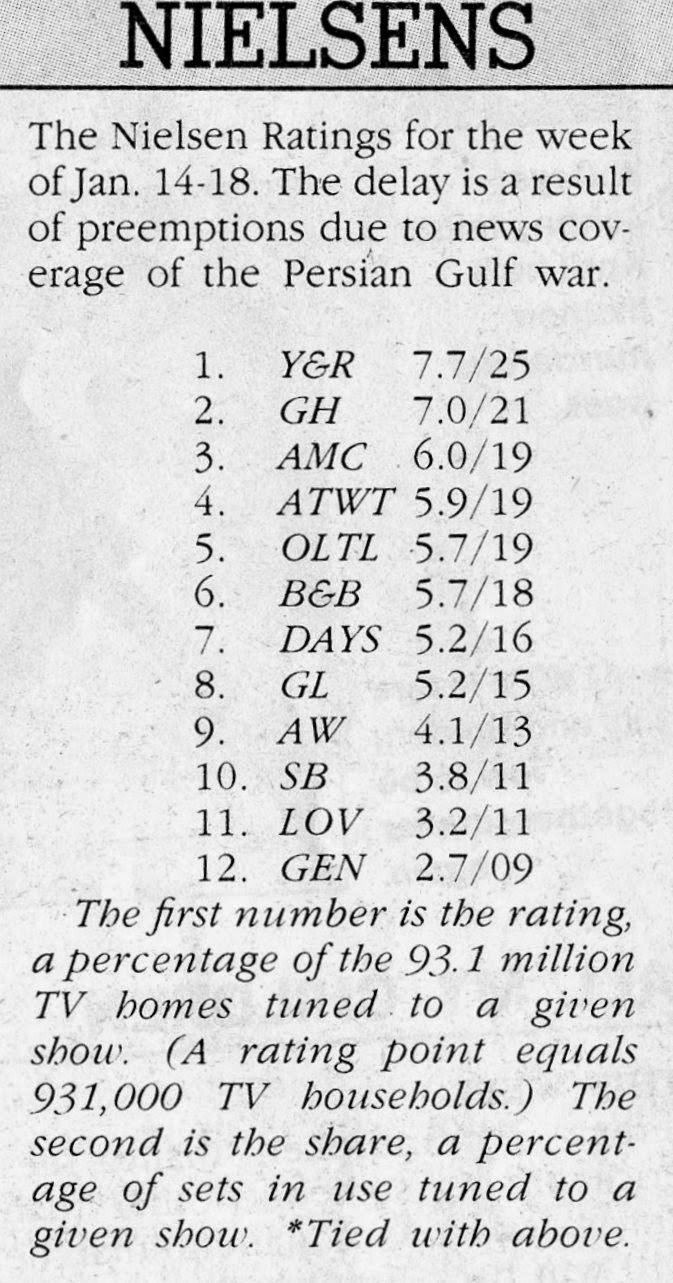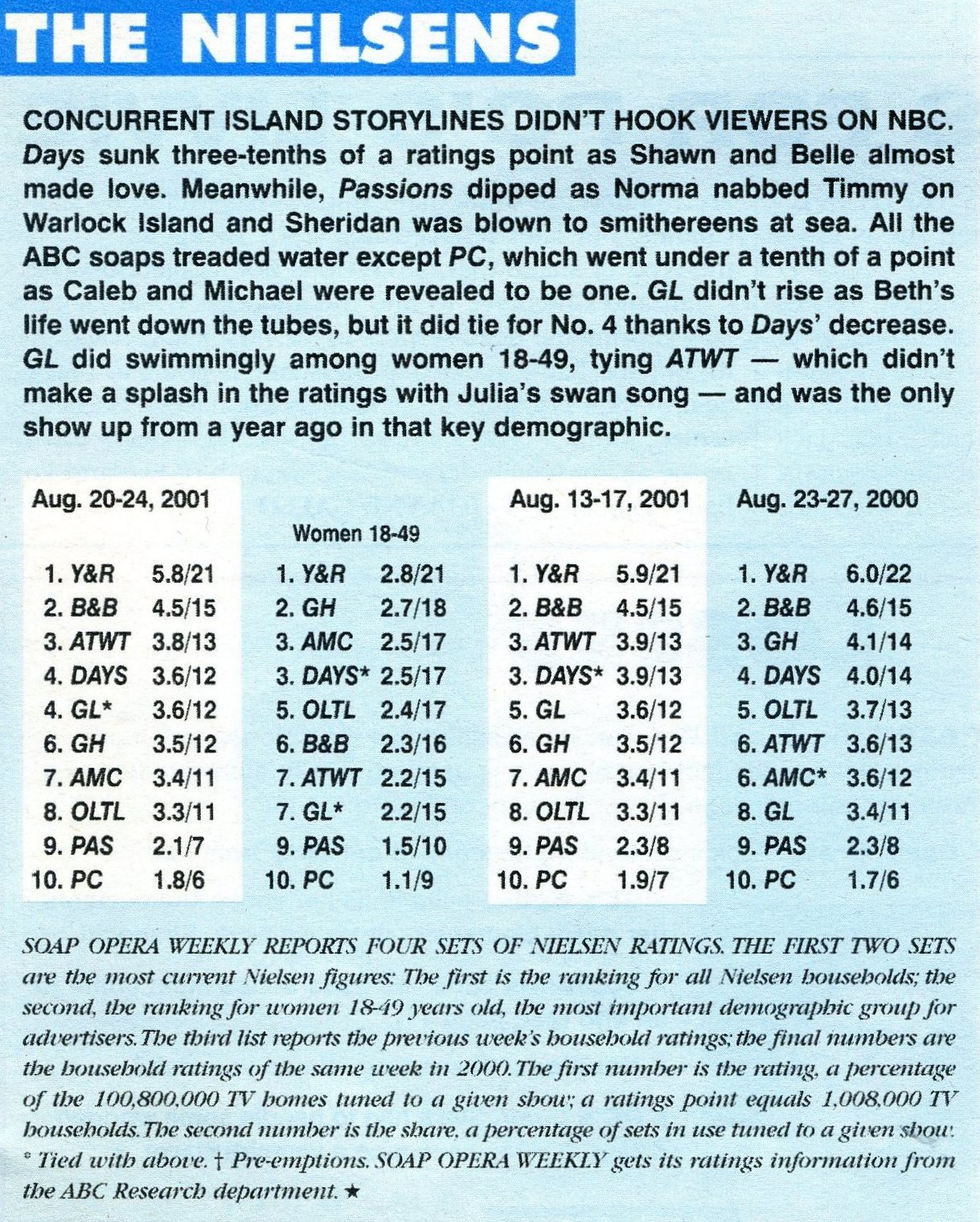Soap opera ratings have become a significant factor in determining the success of television programs. With the evolution of media consumption, understanding how these ratings work is crucial for networks, advertisers, and fans alike. This article will delve deep into the world of soap opera ratings, exploring their history, measurement methods, and their impact on the television landscape.
As soap operas continue to captivate audiences worldwide, the ratings they receive can influence everything from scheduling to production budgets. In this article, we will examine the various factors that contribute to soap opera ratings, the methodologies used to measure them, and what these ratings mean for the future of the genre.
Whether you are a die-hard fan or just curious about the mechanics behind your favorite shows, this comprehensive guide on soap opera ratings will provide you with valuable insights and knowledge. So, let's dive in!
Table of Contents
- History of Soap Opera Ratings
- How Soap Opera Ratings Are Measured
- Factors Affecting Soap Opera Ratings
- Impact of Ratings on Soap Operas
- Current Trends in Soap Opera Ratings
- Challenges Facing Soap Opera Ratings
- The Future of Soap Opera Ratings
- Conclusion
History of Soap Opera Ratings
The phenomenon of soap operas began in the early 20th century, primarily targeting women and often sponsored by soap manufacturers, hence the name. The ratings for these programs have evolved significantly over the decades. In the 1950s and 1960s, soap operas were primarily measured by their viewership numbers, which were reported by organizations like Nielsen.
In the 1980s, the introduction of cable television and new broadcasting technologies introduced more competition. Networks began to invest heavily in soap operas, leading to a surge in their popularity. The ratings during this period saw a peak, with shows like "Days of Our Lives" and "General Hospital" dominating the charts.
Key Milestones in Soap Opera Ratings
- The first soap opera, "These Are My Children," aired in 1952.
- "Guiding Light" holds the record for the longest-running soap opera, airing from 1937 to 2009.
- The introduction of the People Meter in the 1980s revolutionized how ratings were measured.
How Soap Opera Ratings Are Measured
Soap opera ratings are primarily measured through viewership data collected by Nielsen Media Research. This organization uses various methodologies to assess audience engagement with programming.
One common method is the use of "people meters," which are devices installed in selected households that track what programs are being watched and for how long. This data is then extrapolated to provide a broader view of audience behavior across demographics.
Types of Ratings Metrics
- Live Ratings: Measures the number of viewers watching a program as it airs.
- Live + Same Day Ratings: Includes those who watch the show on the same day through various platforms.
- Live + 7 Day Ratings: Accounts for viewers who watch the show within a week of its original airing.
Factors Affecting Soap Opera Ratings
Several factors can influence the ratings of soap operas. Understanding these can help producers and networks make informed decisions regarding their shows.
Key Influencing Factors
- Storyline Quality: Engaging and captivating plots tend to attract more viewers.
- Cast Performance: Talented actors can draw in audiences and retain their interest.
- Social Media Presence: Shows that actively engage with fans online often see an uptick in viewership.
- Competition: The presence of other popular programs airing at the same time can significantly affect ratings.
Impact of Ratings on Soap Operas
Soap opera ratings have a profound impact on various aspects of production and distribution. High ratings can lead to extended seasons, increased budgets, and more promotional efforts, while low ratings might result in cancellations or reduced funding.
Additionally, ratings can affect the advertising revenue generated by a show, which is crucial for its financial sustainability. Advertisers often prefer to invest in programs with higher ratings, ensuring their products reach a larger audience.
Current Trends in Soap Opera Ratings
In recent years, soap opera ratings have faced challenges due to the rise of streaming services and changing viewing habits. Many viewers now prefer on-demand content, which has led to a decline in traditional soap opera viewership.
Despite these challenges, some soap operas have managed to adapt by expanding their digital presence and engaging with fans through social media. For example, platforms like YouTube and Facebook Live have provided new avenues for soap operas to reach audiences.
Challenges Facing Soap Opera Ratings
Several challenges affect soap opera ratings today, including increased competition from reality TV and streaming platforms. Additionally, the COVID-19 pandemic impacted production schedules and viewer habits, further complicating the landscape.
Understanding these challenges is critical for producers and networks as they navigate the future of soap operas in a rapidly evolving entertainment industry.
The Future of Soap Opera Ratings
The future of soap opera ratings will likely depend on how well these programs adapt to changing viewer preferences. Innovations in storytelling, marketing strategies, and distribution methods will be essential for maintaining relevance in the industry.
As audiences continue to shift towards digital content consumption, soap operas that embrace new technologies and platforms are more likely to thrive. Collaboration with streaming services and social media engagement can help revitalize interest in the genre.
Conclusion
In conclusion, soap opera ratings play a crucial role in the television industry, influencing everything from production decisions to advertising revenue. By understanding the history, measurement methods, and factors affecting these ratings, stakeholders can make informed choices that benefit both the shows and their audiences.
We encourage you to share your thoughts on soap opera ratings in the comments below and explore more articles on our site for deeper insights into the entertainment industry.
Thank you for reading! We hope you found this guide informative and engaging. Don't forget to return for more exciting content in the future!




